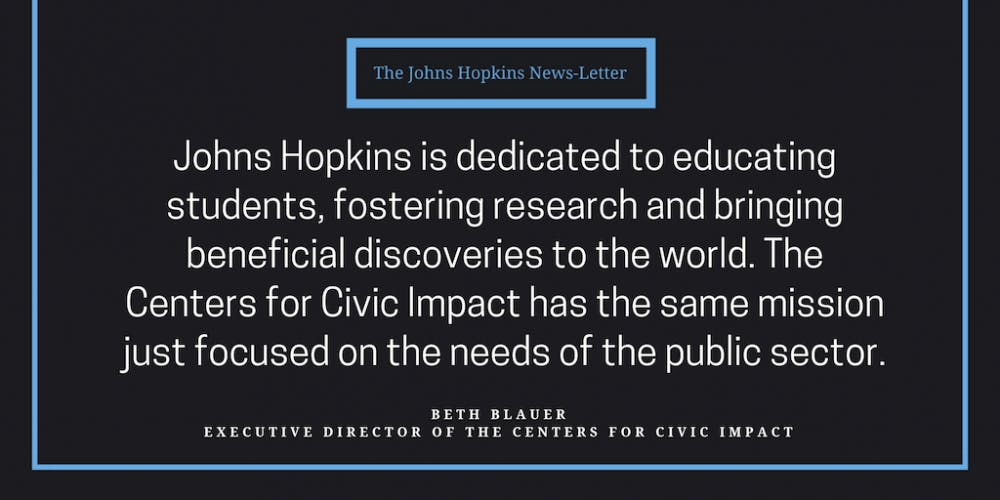The University announced plans to launch a new initiative, entitled Centers for Civic Impact, that aims to help public sector organizations streamline their operations, in an e-mail to the Hopkins community on Monday.
Under this program, Hopkins has created two new programs to work in conjunction with its Center for Government Excellence (GovEx). The broad initiative is comprised of the existing GovEx, a new Center for Applied Public Research and a new web-based training program, GovEx Academy.
The Executive Director of the Centers for Civic Impact Beth Blauer described the reasons for expanding the University’s involvement in the civic impact sector.
“Our reasons for expansion was due to the high demand of these services in particular: data-driven solutions through coaching, public sector training and evidence-based research that can help governments solve problems,“ Blauer wrote in an email to The News-Letter.
“Within Applied Public Research, we are creating Communities of Practice that will allow peers throughout the world to meet and discuss solutions and ideas.”
Hopkins developed GovEx as a consulting group that works with large data sets to improve city government operations in 2015. The Center supports Bloomberg Philanthropies, a nonprofit founded by Michael Bloomberg, and its effort to take evidence-based recommendations to municipal governments around the world.
GovEx has worked with over 100 cities and trained over 2,000 government employees so far. In Jackson, Miss. the GovEx team used big data to locate the inefficiencies in the city’s budget by comparing Jackson to mathematically similar cities. This allowed the city to go from having a $14 million deficit in 2014 to a $6 million surplus deficit in 2017.
The Center for Applied Public Research seeks to conduct research on three primary focus areas in order to best improve public health and well-being. These areas are economic mobility, education and workforce and food insecurity. The Center’s website indicates that they aim to make their research findings accessible for governments and nonprofits.
The website currently features a series of blog posts on each of these topics. Authors for these blog series include Nadir Al Kharusi, a graduate student in Applied Economics; Katherine Klosek, the director of applied research at GovEx; and Allison Hardebeck, a junior in Public Health Studies. The blog addresses current policy issues and evaluates proposed solutions, with a focus on analytical approaches.
GovEx Academy is an online learning tool similar in format to massive open online courses such as the ones offered on larger platforms like Coursera and EdX. Some of the 10 courses offered include “Getting Started with Data Management” and “Foundations of Open Data.” While four of these courses are free, the rest cost several hundred dollars each. The platform is intended for public sector employees to acquire data analysis skills.
Blauer explained how the Centers for Civic Impact operate financially.
“Governments of all kinds (states, regions, counties, cities and countries) have two ways to work with any of the Civic Impact centers. We have a grant-driven model with partners such as Bloomberg Philanthropies, Ballmer Group, Knight Foundation, and others, which allow us to provide coaching and training at no direct cost to the government,” Blauer wrote. “We also operate a fee-for-service model which, because we are a nonprofit, allow us to work directly with governments for much less than traditional consulting companies charge for similar services.”
Freshman Sylvana Schaffer believes that the initiative has potential, particularly in the Baltimore region.
“It could do a lot of good to help out with local governments, and it could do a lot for communities,” Schaffer said. “We should definitely be aware ... of our influence in the Baltimore area and how much good we could do specifically for Baltimore.”
Schaffer also added that social science research opportunities on campus can be scarce.
“There are a lot of undergrads, especially in the social sciences and humanities fields, where they don’t necessarily have the same opportunities to do research that are open to people that are doing a STEM major, so I think things like this would definitely be of interest to a lot of undergrads.”
Blauer explained that the Civic Impact initiative maintains the University’s overall mission, while broadening its scope.
“Johns Hopkins is dedicated to educating students, fostering research and bringing beneficial discoveries to the world. The Centers for Civic Impact has the same mission just focused on the needs of the public sector — educating government and [non-government organization] staff, connecting research to real world policy creation, and sharing the cultural and policy changes which make an impact,” Blauer wrote.





